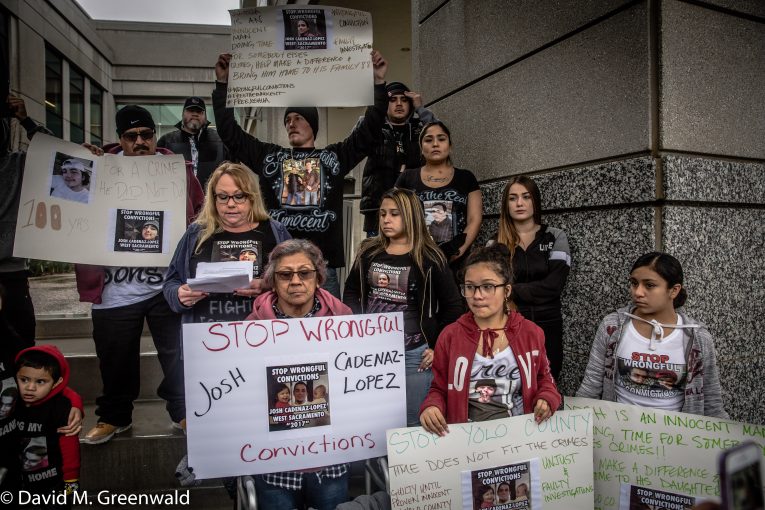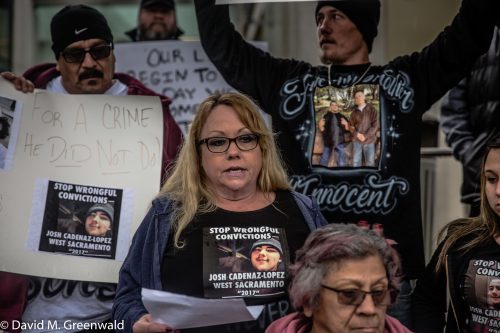

The question has been asked so many times and in so many different ways – how can we put so many people in prison for crimes that they did not commit? There have been some good answers offered, but as I watched Judge David Rosenberg rule on motions for a new trial, I realized that, above all, the system has no reasonable way to correct itself in a case of wrongful conviction – without the evidence of substantial error or substantially new evidence.
What happens if the jury simply weighed the existing evidence incorrectly? As Judge Rosenberg himself stated on Friday, “The jury could have gone a different way, but it didn’t.”
The problem is that if the jury got it wrong here, this is not a mere academic exercise – Joshua Cadenaz-Lopez is facing an effective life sentence for the series of robberies that he was convicted of, but for which there is substantial evidence that he did not commit.
As I watch the case of Joshua Cadenaz-Lopez, technically speaking he has one more chance – he will get that in August with a motion on ineffective assistance of counsel.
While there are perhaps clear examples of ineffective counsel, Judge Rosenberg at several points made it clear that Jem Martin, the private counsel who has since been let go by the defendant, raised those issues in trial.
Proof beyond a reasonable doubt is utilized for the defendant – until a jury convicts him. At that point, the jury’s verdict becomes sacrosanct until there is substantial evidence introduced that error occurred, or new evidence emerges. The truth comes out sometimes, but years later. Years that will be spent in a prison cell rather than living his life.
In this case, I am troubled because there would seem to be substantial evidence pointing to innocence – enough that the jury should have at least had reasonable doubt to Mr. Cadenez-Lopez’s guilt.  But it didn’t. We don’t know why that is – what we do know is the state of the evidence.
But it didn’t. We don’t know why that is – what we do know is the state of the evidence.
First, we have no real identification of the defendant at the scene or on video.
The video does not show a face, and there are physical attributes that point against it being him – tattoos that he does not have, and the legs in the video do not appear to match the defendant’s legs.
Mr. Martin, in trial, pointed out that the physical features of the defendant did not match those in the video. In particular, he noted in the surveillance footage there was no discoloration seen where the tattoo was. The fact that the defendant had hairy legs was pointed out to the court, noting again the footage where the perpetrator appeared to have hairless legs.
The defendant’s mother also questioned whether the surveillance videos actually showed her son. She does not believe they do.
“My son was not there,” she said. “In surveillance shots of the robbery, the person they say is Josh, he is wearing shorts. This person’s leg is thick, white and hairless. My son has chicken legs and is totally hairy. He has a tattoo on his left chest area. The person had an open jacket with a tank top which (was) set low enough to see Josh’s tattoo. The mask he wore was a ski mask at Denny’s and where the mask goes around (the) mouth you see no facial hair.”
Then there is the alibi. Mr. Cadenaz-Lopez was actually passed out on drugs at his home at the time of the crimes.
Mr. Martin argues, “There was substantial, uncontroverted evidence which supported Defendant’s alibi that he was not present at the robberies because he was passed out at home during that time, high on some combination of alcohol, marijuana and narcotics.”
However, while the defense introduced substantial alibi evidence, and even with claims that the judge mis-instructed the jury on that evidence, Judge Rosenberg didn’t see enough to overturn the verdict.
Finally, not only did the defense have a theory that Mr. Cadenaz-Lopez was not there, but they presented evidence of third-party culpability.
Mr. Martin argued the biggest piece of evidence was evidence that “the person wearing the green gloves in the robberies, who was alleged to have been (Mr. Cadenaz-Lopez), was actually an uncharged third party, Alec Jorrin.”
Mr. Martin notes, “The Defense produced evidence that showed that Mr. Jorrin was wearing the exact same shoes, in a video taken just weeks before the robberies that he wore in the robberies. The shoes attributed to (Mr. Cadenaz-Lopez), which were found at another defendant’s residence, do not match the shoes worn by the actual robber, in the surveillance videos.”
Ava Landers, an appointed attorney who has taken over Mr. Cadenaz-Lopez’s representation, thus has a fairly tall task – she has to explain to Judge Rosenberg why her client received ineffective assistance of counsel (IAC) when it appears that Mr. Martin at least raised all of these critical points. In his initial motion, though, Mr. Martin offers IAC as a defense, though he does not elaborate on it.
We will find out in August if the defendant gets a new trial. But, I would suggest that is almost beside the point here. There is substantial evidence that was presented at trial and in post-trial pleadings – including the fact that he passed a polygraph test, something that is inadmissible – that Joshua Cadenaz-Lopez is innocent of this crime.
Given that he is facing a life sentence, shouldn’t we be a bit more certain about whether he actually committed the crime in question – prior to sentencing him to prison for the rest of his life?
In a reasonable system, the judge would err on the site of proof beyond a reasonable doubt, call into question the evidence, and have a second jury take a look at this case before we condemn a potentially innocent man – who is in his early twenties – to the rest of his life in prison.
If I went to a doctor and got a prognosis that I was going to die, I would probably want a second opinion before making my funeral arrangements. And yet we don’t extend the same courtesy to people facing life terms.
It is a system that, despite all we have learned in the last 20 years, simply does not work. And now another possibly, maybe even probably, innocent man will spend decades of his life – if not life itself – behind bars as we fumble around with the levers of justice.
—David M. Greenwald reporting
Get Tickets To Vanguard’s Immigration Rights Event
